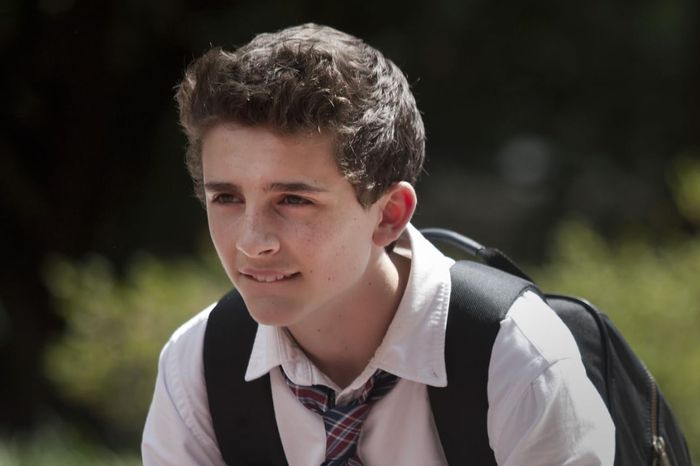
Timothée Chalamet is really good at playing a little shit. A petulant smirk, a cooler-than-thou eye roll, or a beleaguered sigh that can convey arrogance and puerility. And it all started on Homeland.
In 2012, Chalamet appeared in eight of the second season’s 12 episodes — his biggest TV role to date — as Finn Walden, the son of America’s war-mongering vice-president. While the show was mostly about America’s post-9/11 national-security frenzy, the relationship between Finn and Dana (Morgan Saylor), daughter of Marine turned terrorist turned senator Brody (Damian Lewis), felt like a plotline from an aughts-era teen soap. Finn and Dana fall for each other at their expensive private school; Finn and Dana hit a woman with his 16th-birthday-gift BMW and leave her to die; Finn and Dana argue about whether they should turn themselves in or let their parents’ connections keep them out of trouble. Their whole deal is sort of like that time Landry killed someone in Friday Night Lights, which is to say it’s perfectly overwrought. And Chalamet’s performance — all his negging flirtiness, jittery panic, and smug cynicism — is key to that affect.
According to Homeland casting director Judy Henderson, Finn was written as “educated” but not “a goody-goody two shoes.” In more words, “likable, but with an edge.” The rule-breaking rich white boy is a TV archetype: Logan Huntzberger, Oliver Trask, Nate Archibald. But there was a rawness to Chalamet, both because of his actual youth (he was 16 while filming) and his lack of professional experience, which gave Finn Walden some convincing immaturity. Finn is a bureaucrat-in-training jerkoff who diminishes Dana’s feelings and then mocks her for having a conscience. Yet Chalamet gave him layers — a sliver of pitiable self-protection and tragic besottedness.
So much of what drives Finn is reflected in a need for immediate approval. In “The Smile,” Dana challenges a classmate who says that the U.S. and Israel should use nuclear weapons against Iran, blurting out, “What if I told you my dad’s a Muslim?” Finn responds with a cheap joke and relishes the subsequent laughs: “Right, and mine’s a Scientologist.” (He later peers through his hands — “Just trying to picture you in a burka.”) “You can be a real asshole, you know that,” Dana tells him in “Beirut Is Back,” to which he responds, “I can?” with all the physical emphases necessary to indicate he knows he can. He simply chuckles when Dana calls him a “poor little rich boy,” so it’s narratively not a surprise that Finn is threatened by, rather than attracted to, Dana’s directness — especially when she calls him a murderer. (He is.)
Chalamet’s physicality is unexpected, though. His tantrum in “A Gettysburg Address” — that full-body shake, sharp stare, and lunge forward at Dana after she tells him she went to the hospital to visit the person they ran over, without his permission — is effective because it’s such a contrast to his otherwise lazy cool-guy presence. Chalamet’s elfin features can be very unsettling when he explodes into anger, making it all the more noticeable when he trails off the end of “What the fuck is wrong with you,” as if he doesn’t even have the energy to consider Dana’s betrayal. He looks away from her at the end of their fight, like he’s lost all interest in her. Dana later pressures Finn to join her in telling their parents the truth about the hit-and-run, which they do in “The Clearing.” Dana assumes Finn’s parents will force him to take responsibility for driving the car that night, but of course she’s wrong. His parents will cover up the accident to keep his father’s political prospects bright.
“I know how this goes. Good luck with that,” Finn scoffs and grins when she threatens to go to the police. How does it go? Even Dana’s own father Brody walks back his promise to help her turn herself in because of his professional relationship with Finn’s vice-president father. When Finn’s dad eventually dies, Brody attends his funeral in “The Choice.” “Tell Dana I said ‘Hi,’” Finn tells Brody when they run into each other. Chalamet plays the words as innocuous as they are goading. When he breaks Finn’s eye contact with Brody, it’s like he’s finally ashamed of what he’s able to get away with.
Homeland set the stage for the two primary paths Chalamet’s career would take in the years after he abandoned television: His best roles are bad boyfriends in Lady Bird and Little Women and chosen ones in The King and Dune. Since Homeland, Chalamet has said he wasn’t fully happy with his performance: “When I watched it back, I always felt like there were moments where I just played the antagonist, as opposed to finding the real human in that.” Maybe he favored the left side of his mouth a little too much when grimacing, maybe he pitched his voice a little too low when Finn was selling himself as a decent boyfriend type, but his early turn as a fuckboi heir told us the kind of actor he was going to be.
MORE FROM TIMMY WÉEK
- We Néed Timmy’s É
- Whither Timothée Chalamet’s Bleu de Chanel Commercial?
- How French Is Timothée Chalamet?


